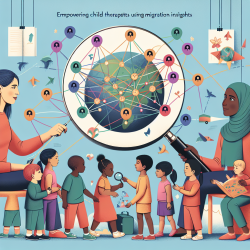Introduction
The COVID-19 pandemic has brought about unprecedented changes to family dynamics and well-being. Recent research, particularly the study titled "Relative Importance of Well-Being Determinants in Atlantic Canadian Families During the Pandemic," provides valuable insights into how families can foster well-being during such challenging times. This blog aims to help practitioners enhance their skills by implementing the outcomes of this research and encouraging further exploration into the factors that contribute to family well-being.
Understanding the Research
The study examined the relative importance of various factors contributing to child, parent, and family well-being during the pandemic. Conducted in the Atlantic provinces of Canada, it involved 536 participants who completed a cross-sectional survey in 2021. The research identified 21 predictor variables, including family activities and time-use changes, which accounted for significant variance in well-being at different levels.
The top predictor of well-being across all levels was family closeness, emphasizing the importance of strong family bonds. Other significant predictors included leisure activities such as play, meal preparation, self-care, and rest.
Implementing Research Findings
For practitioners working with families, the findings of this study offer actionable insights:
- Promote Family Closeness: Encourage families to spend quality time together. Activities like playing games, cooking, or simply having conversations can strengthen family bonds.
- Facilitate Leisure Activities: Guide families to incorporate leisure activities into their routine. These activities not only provide relaxation but also foster family cohesion.
- Support Self-Care: Emphasize the importance of self-care for parents. When parents take care of themselves, they are better equipped to support their children's emotional and physical needs.
Encouraging Further Research
While the study provides valuable insights, it also highlights areas for further research. Practitioners are encouraged to explore additional factors that may influence child well-being, as the study suggests there may be predictors not accounted for in the analysis. Longitudinal studies could provide deeper insights into the long-term effects of pandemic-related changes on family well-being.
Conclusion
The pandemic has underscored the importance of family closeness and leisure activities in promoting well-being. By focusing on these areas, practitioners can help families navigate challenging times more effectively. As we prepare for potential future disruptions, creating conditions conducive to family closeness and leisure will be crucial in supporting overall well-being.
To read the original research paper, please follow this link: Relative Importance of Well-Being Determinants in Atlantic Canadian Families During the Pandemic.










